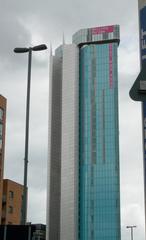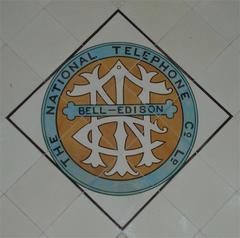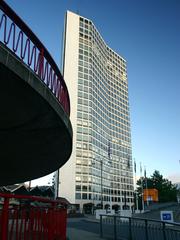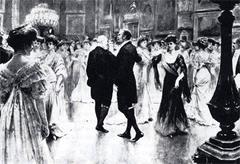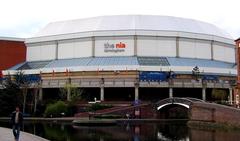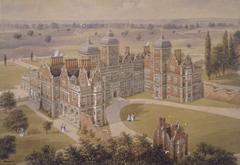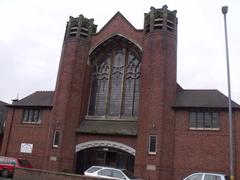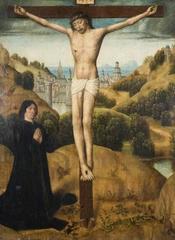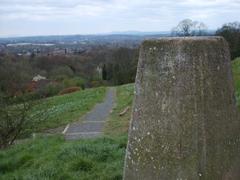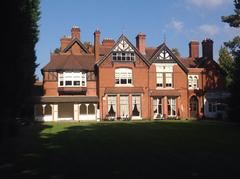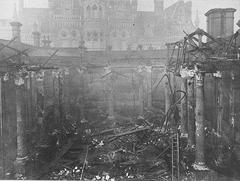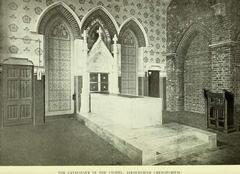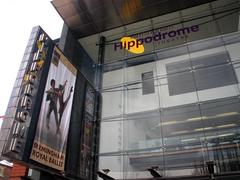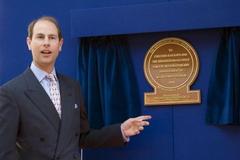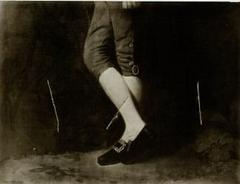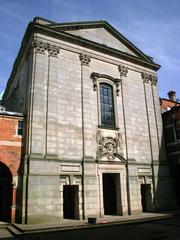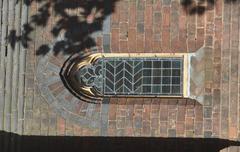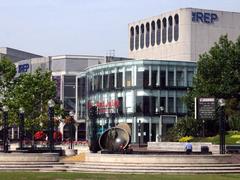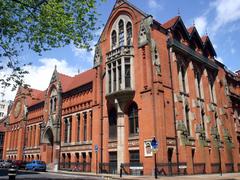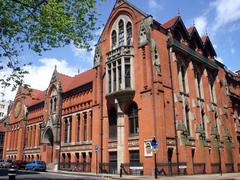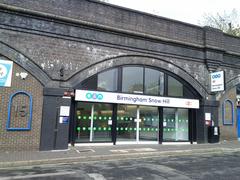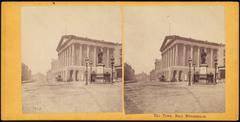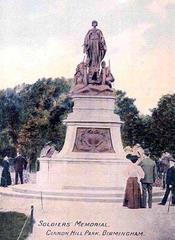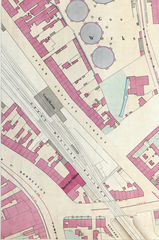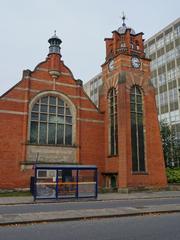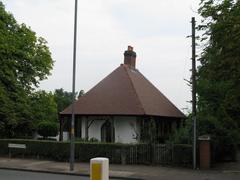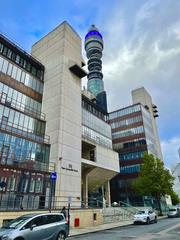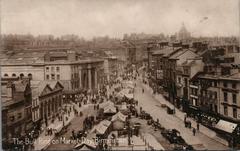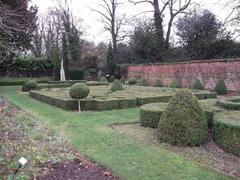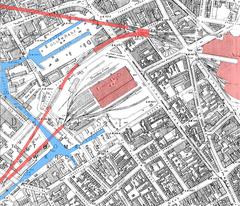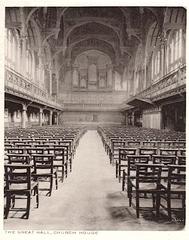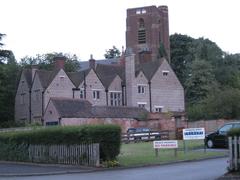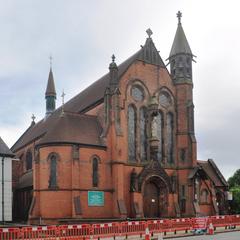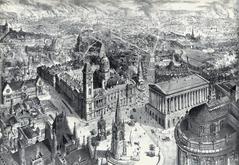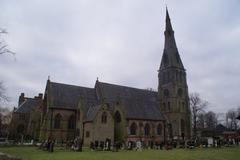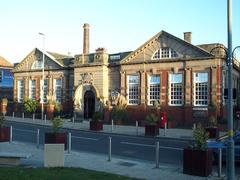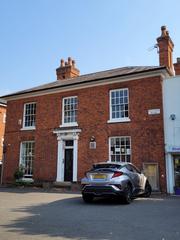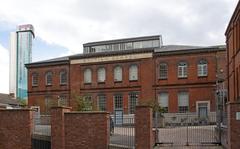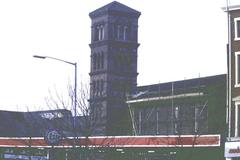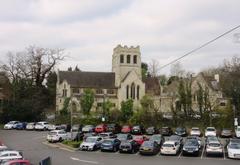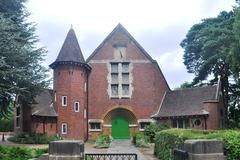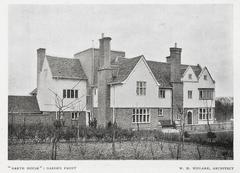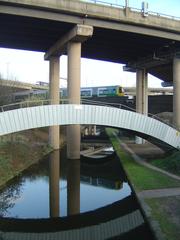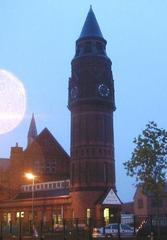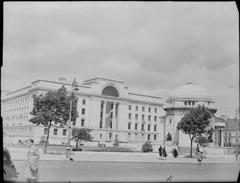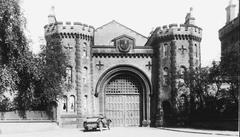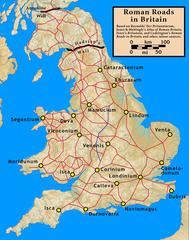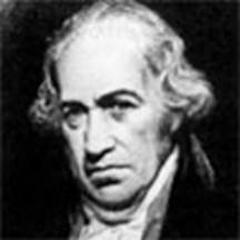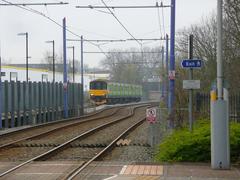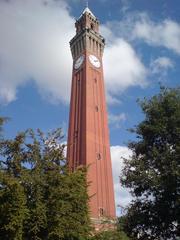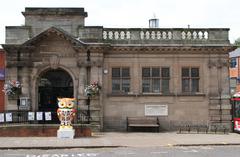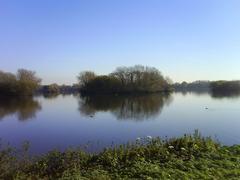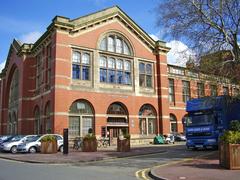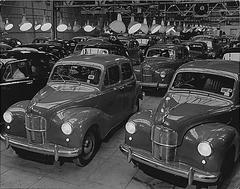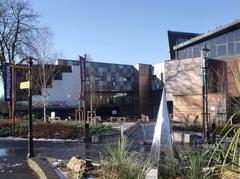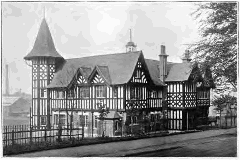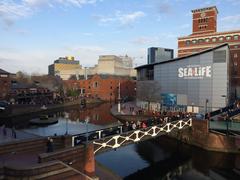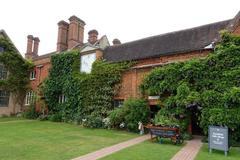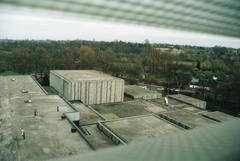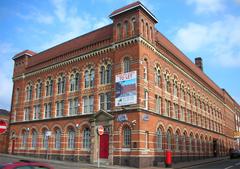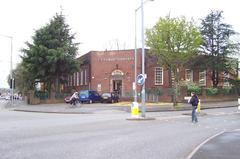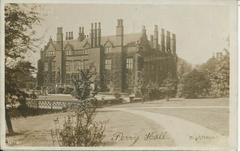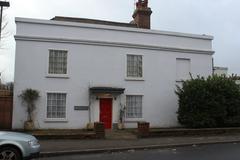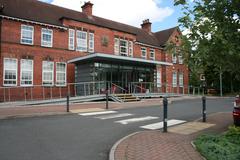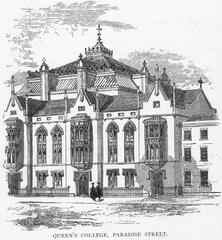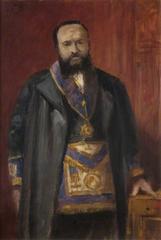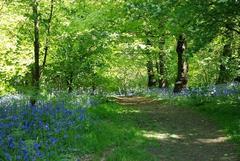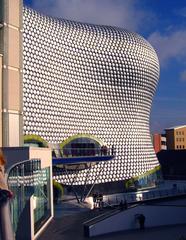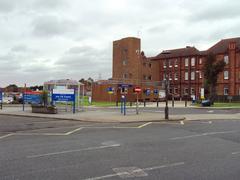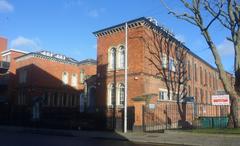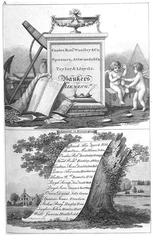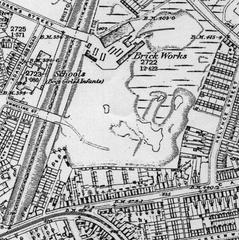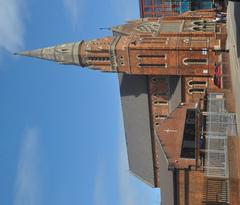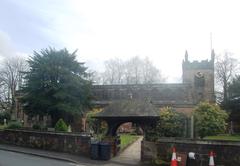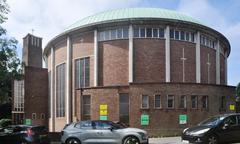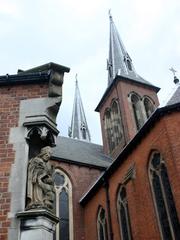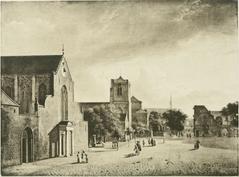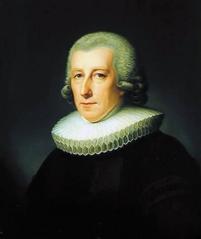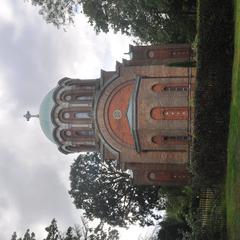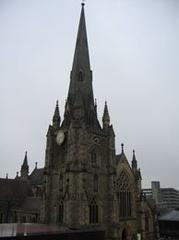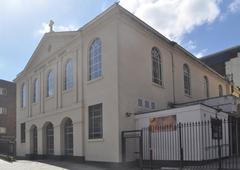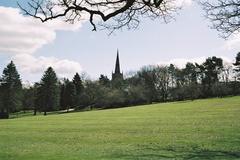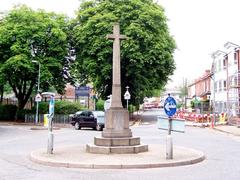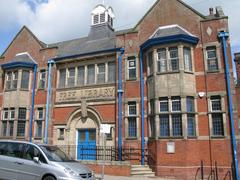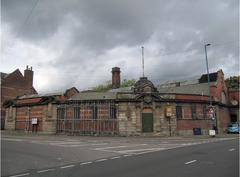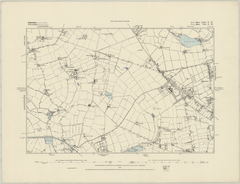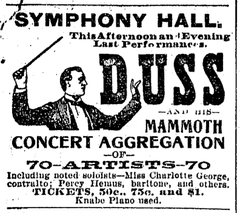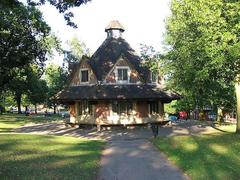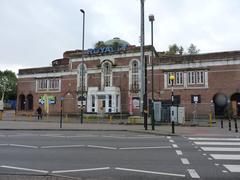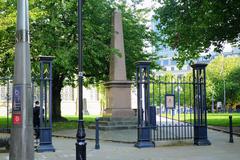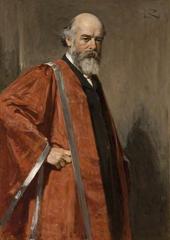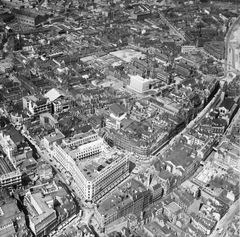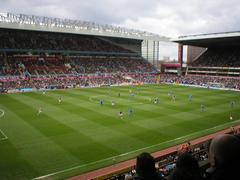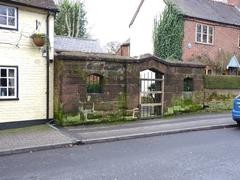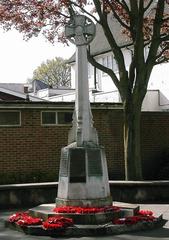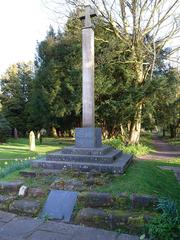Edgbaston War Memorial: Visiting Hours, Tickets, and Birmingham Historical Sites Guide
Date: 14/06/2025
Introduction
The Edgbaston War Memorial, located in the tranquil suburb of Edgbaston in Birmingham, is a distinguished landmark that honors the memory of local men and women who gave their lives in the World Wars and subsequent conflicts. Standing outside the historic St Augustine’s Church on Lyttelton Road, the memorial is both a site of solemn remembrance and an architectural gem, reflecting Birmingham’s commitment to preserving its heritage. Designed by J.H. Morcom and unveiled in 1921 after a community-led competition, the memorial blends Classical and Art Deco elements, symbolizing sacrifice and unity across all faiths.
Accessible year-round during daylight hours, the Edgbaston War Memorial is open to all without an admission fee. Its setting within the Edgbaston St Augustine’s Conservation Area, adjacent to the Grade II*-listed church, offers visitors a rich historical experience. The memorial also serves as a focal point for Remembrance Day ceremonies and supports educational and community engagement through inscriptions, guided tours, and local events.
This comprehensive guide covers the memorial’s history, architectural significance, practical visitor information, and nearby attractions, making it an essential resource for anyone exploring Birmingham’s historical sites.
Table of Contents
- Introduction
- Historical Background
- Architectural Design and Symbolism
- Visiting Information
- Cultural and Social Importance
- Educational Value and Community Engagement
- Nearby Attractions
- Practical Tips
- Visuals and Media
- Frequently Asked Questions (FAQ)
- Conclusion
- References
Historical Background
The Edgbaston War Memorial was conceived shortly after the First World War, arising from a community initiative to commemorate local sacrifices. Its design was selected through a competition that emphasized inclusivity—eschewing denominational imagery to reflect the diverse beliefs of Edgbaston’s residents. The memorial was unveiled in 1921 and later updated to honor those lost in the Second World War and other conflicts (Historic England – Edgbaston War Memorial).
Edgbaston itself has a long history, with roots stretching back to the medieval period. The area is known for its elegant villas, green spaces, and significant landmarks such as St Augustine’s Church and Edgbaston Reservoir, which have served as gathering places for both worship and remembrance (Edgbaston Church History).
Architectural Design and Symbolism
Origins and Designer
The memorial’s design by J.H. Morcom was selected for its “severest simplicity,” as described by Reverend Rosslyn Bruce, and was praised for its ability to unify the community through non-religious symbolism (Historic England Advice Report).
Style and Craftsmanship
- Classical and Art Deco Fusion: The tall Portland stone column is topped with a stylized eternal flame, symbolizing life and remembrance. The structure is flanked by sculpted angels holding laurel wreaths, representing guardianship and victory.
- Materials: High-quality Portland stone and refined carvings reflect both durability and skilled craftsmanship, with construction costs totaling £640 in 1921.
- Integration: The memorial’s clean lines and scale harmonize with the adjacent Grade II*-listed St Augustine’s Church, enhancing the conservation area’s historic character.
Symbolic Significance
- Inclusivity: The absence of overt religious symbols allows the memorial to resonate with families of all faiths.
- Inscriptions: Names of local parishioners from both World Wars personalize the monument and foster community memory.
- Group Value: The memorial and church together form a significant historic ensemble.
Visiting Information
Hours and Admission
- Opening Hours: The memorial is accessible outdoors year-round during daylight hours (typically 8:00 AM to dusk). There are no formal opening or closing times.
- Admission: Free; no tickets required.
Accessibility
- Physical Access: The site features paved, level pathways suitable for wheelchair users. Benches are available nearby.
- Additional Facilities: Accessible restrooms may be available at St Augustine’s Church during opening hours.
Travel and Parking
- Public Transport: Served by local bus routes on Harborne Road and Lyttelton Road; Edgbaston Village and Five Ways train stations are a short taxi or bus ride away.
- By Car: Limited street parking is available in the area. Use public car parks or park-and-ride services for convenience, especially during events.
Tours and Events
- Guided Tours: Offered periodically by local heritage groups and St Augustine’s Church; check the church website or community listings for schedules.
- Ceremonies: The memorial is the centerpiece of annual Remembrance Day and Armistice Day events, drawing local residents, officials, and veterans.
Photographic Tips
- Lighting: Early morning and late afternoon offer the best natural light for capturing the memorial’s stone textures.
- Context: Position the memorial with St Augustine’s Church in the background for a sense of place.
- Respect: Remember the site’s solemn purpose when taking photographs.
Cultural and Social Importance
The Edgbaston War Memorial serves as both a communal and individual space for remembrance, transcending denominational lines. Its design and inscriptions reflect the area’s demographic diversity, with names representing a range of social and economic backgrounds. The memorial’s unveiling in 1921 and subsequent ceremonies continue to foster community cohesion and intergenerational remembrance (Western Front Association – Edgbaston Memorial History).
Educational Value and Community Engagement
- Educational Programs: Schools and local groups regularly use the memorial for educational activities and historical research.
- Archival Materials: Parish records and local archives held in Birmingham document the memorial’s planning and construction, providing rich material for further study.
- Inclusivity: The site’s non-denominational ethos and evolving inscriptions ensure relevance for future generations.
Nearby Attractions
- St Augustine’s Church: A Grade II*-listed church with roots in 1279, open for tours and worship (St Augustine’s Church, Edgbaston).
- Birmingham Botanical Gardens: Established in 1832, featuring glasshouses and exotic plants.
- Edgbaston Reservoir: Ideal for scenic walks and birdwatching.
- Edgbaston Cricket Ground: Home to Warwickshire County Cricket Club (Edgbaston Stadium).
- Barber Institute of Fine Arts: Noted for its Art Deco architecture and world-class art collection (The Crazy Tourist).
Practical Tips
- Best Times to Visit: Weekday mornings or late afternoons for a quieter experience; Remembrance events in November for community atmosphere.
- What to Bring: Comfortable walking shoes and a camera; dress appropriately for outdoor conditions.
- Amenities: Cafés and restaurants are plentiful in Edgbaston; public restrooms available in local venues.
Visuals and Media
- Suggested Images: Edgbaston War Memorial with symbolic flame; sculpted angels detail; panoramic view with St Augustine’s Church.
- Alt Text Suggestions: “Edgbaston War Memorial visiting hours,” “Edgbaston War Memorial inscriptions,” “Birmingham historical sites Edgbaston.”
Frequently Asked Questions (FAQ)
Q: What are the visiting hours of the Edgbaston War Memorial?
A: The memorial is accessible outdoors year-round during daylight hours.
Q: Is there an admission fee or are tickets required?
A: No, the memorial is free to visit and does not require tickets.
Q: Is the site wheelchair accessible?
A: Yes, with level paved pathways and nearby benches.
Q: Are guided tours available?
A: Occasionally, through local heritage groups or St Augustine’s Church. Check their website or local listings.
Q: Can I take photographs at the memorial?
A: Yes, but please respect the memorial’s solemn nature.
Q: Are nearby attractions worth visiting?
A: Absolutely; St Augustine’s Church, Birmingham Botanical Gardens, and Edgbaston Reservoir are all within walking distance.
Conclusion
The Edgbaston War Memorial stands as a vital testament to Birmingham’s history, community, and enduring commitment to remembrance. Its elegant design by J.H. Morcom, inclusive ethos, and harmonious setting alongside St Augustine’s Church make it a meaningful destination for reflection, education, and civic engagement. With year-round free access and proximity to other notable sites, the memorial is a must-visit for anyone interested in Birmingham’s cultural heritage.
Plan your visit today and enhance your experience with resources like the Birmingham City Council’s War Memorials page or the Audiala app for audio guides and detailed historical insights. Support local heritage by sharing your visit and engaging with ongoing preservation efforts.
References
- Historic England – Edgbaston War Memorial
- Historic England Advice Report
- Western Front Association – Edgbaston Memorial History
- Edgbaston Church History
- Birmingham City Council – War Memorials in Birmingham
- St Augustine’s Church, Edgbaston
- Edgbaston Stadium
- The Crazy Tourist – Best Places to Visit West Midlands
